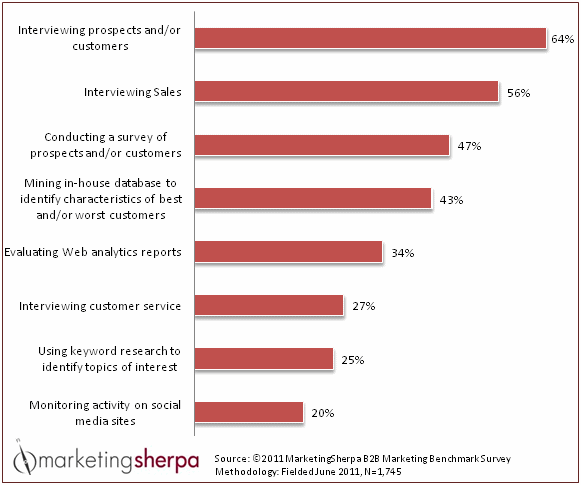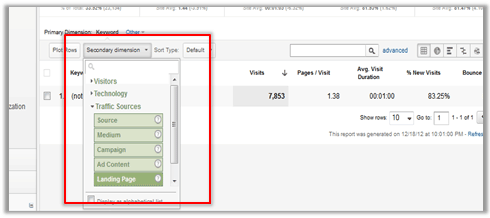What B2B SEOs Need To Know About Buyer Personas
While buyer personas (user personas) are an established concept in broader B2B marketing discussions, it has taken on new life in recent years. The shift organizations are making to a digital marketing strategy coupled with innovation in technology (should) allow Internet marketers the ability to deliver effective content marketing campaigns across segmented audiences or targeted […]
While buyer personas (user personas) are an established concept in broader B2B marketing discussions, it has taken on new life in recent years. The shift organizations are making to a digital marketing strategy coupled with innovation in technology (should) allow Internet marketers the ability to deliver effective content marketing campaigns across segmented audiences or targeted groups.
Developing B2B buyer personas can be an essential part of this, since understanding the goals, needs, and limits of a buyer are important to crafting the right content needed for SEO and social media marketing. This column takes a look the development of buyer personas for B2B marketing and the impact SEO professionals should have on the process.
What Are Buyer Personas?
My quick, interpretative definition of a “buyer persona” is a representative profile of a particular target audience segment. However, several more experienced B2B marketing professionals have paved the way for the understanding I have in B2B buyer personas. Here are some of their definitions:
- Ardath Albee & MLT Creative: “A buyer persona is a composite of different factors that affect your buyer and motivate him/her to buy. Your prospect’s buying cycle and buying decisions are situated within a larger context that must be understood in order to motivate his/her buyer behavior.” (source)
- Tony Zambito: “We define buyer personas as the process of not only developing archetypal representations of buyers, but also the process of gathering insights, developing buyer scenarios, tapping into mental models, and mapping to the buying process.” (source)
- Adele Revella: “A buyer persona as an archetype; a composite picture of the real people who buy, or might buy, products like the ones you market, based on what you’ve learned in direct interviews with real buyers.” (source)
As Albee indicates in an interview with the Content Marketing Institute, what makes B2B buyer personas different than general user personas is the complex sales cycle of B2B solutions. There are usually multiple decision makers involved in the process. B2B Internet marketers need to think about SEO, social media, and content marketing efforts meant to satisfy a more diverse set of requirements across multiple personas.
How Do B2B Marketers Develop Buyer Personas?
About a year ago, MarketingSherpa highlighted survey data from their B2B Marketing Benchmark report, asking what the most effective tactics were in developing buyer personas. Here is a screenshot of survey responses.
Survey results support the hypothesis that effective persona development requires a combination of qualitative (interviews) and quantitative (research and tools) measurements. Interviews to key sales personnel and customers, the most effective types of tactics, are supported by analysis through survey development, site traffic reports, and keyword research.
There are several good resources for developing effective questions to ask in the interviews with sales personnel and customers in B2B buyer persona development. Here are a few:
- Up Close & Persona Interactive Buyer Persona Template
- Core Buyer and Product-Based Buyer Persona Templates
- Building Buyer Personas: A Checklist For High-Tech Marketers
What Challenges Do Marketers Face With Buyer Personas?
Unfortunately, building effective buyer personas is not as easy as one might believe. I find two specific challenges consistently appear when B2B marketers discuss obstacles in effective buyer persona development.
- Building The Unusable
(Or getting stuck in the semantics). In a recent article from Ardath Albee, she explains how B2B marketers based persona creation off of traditional information gathering techniques (how someone gets to know an individual) instead of truly “buyer-centric” exploration. In other words, personal information and interests (like “does my buyer have a jack russell terrier”) would rarely come into the equation. - Failing To Remain Objective
Another common problem is in creating buyer personas which reflect the creator’s interest and not the buyer’s. As discussed in a blog post from Dayna Rothman of Marketo, the best way to overcome this obstacle is in solid quantitative research.
5 Ways B2B SEO Impacts Buyer Persona Development
As our organization learns more about buyer personas, how and why they are developed, and how they impact B2B marketing strategy, ties to the SEO process (and vice versa) emerge. Here are five initial points of connectivity.
- Build Keyword Research Into The Interview Process
Ask sales personnel what keywords (terminology) often come up in the sales discussions and prospecting calls. Ask customers what keywords they used to find the organization, industry information, and research. If possible, breakout keyword information based on the roles and titles of customers and prospects interviewed as well. - Segment & Extend Keyword Research
Breakout existing keyword research into the various buyer persona segments. In the interview process, provide an initial set of keywords to interviewees for establishing relevance, that can be, in turn, used for further keyword exploration. Evaluate associated search engine results (based on interview feedback and keyword research) to determine related content marketing opportunities. - Evaluate Landing Page Activity
Provide B2B marketing teams visitor activity associated with search engine referral traffic. In Google Analytics, use advanced segments and secondary dimensions to isolate search engine referrals associated with landing pages for all search traffic, important keywords, and “not provided” data.
This data should help support and augment content marketing development through the identification of website assets that perform better, in terms of visit duration, exit rates, and conversion rates, etc.
- Merge SEO Trends With Prospect Activity Reports
Popular marketing automation tools integrate prospect activity with referral source information. These reports provide a compelling story for validating (or adjusting) buyer persona projections. Cross-reference related visitor activity — comparable keyword referrals and associated visitor performance — to known prospect behavior in marketing automation reports, to determine whether website traffic patterns accurately support interview responses. - Build Better Keyword-Oriented Content
Input from sales and customer interviews coupled with existing traffic reporting data should help B2B SEO’s find a wider range of keyword targets and provide opportunity for creating more targeted, appropriate content marketing assets.
Final Thoughts
Unfortunately, buyer persona creation is not integrated into the majority of B2B organizations. In the MarketingSherpa report referenced above, only 41% of organizations polled had established personas. The rapid growth in technological innovation and digital content consumption necessitates B2B buyer persona development in order to overcome the “digital noise” online.
Furthermore, as case studies illustrating the success of B2B marketing tactics initiated through the use of buyer personas are realized, adoption will certainly increase.
B2B SEO stands to be improved through tighter integration in buyer persona development and vice versa. This connection is similar to why SEO professionals are involved in site development, marketing communications, and content strategy.
What do you think? Is your organization building buyer personas in their B2B marketing strategy? I would love to read your perspective and feedback via comments below.
Contributing authors are invited to create content for Search Engine Land and are chosen for their expertise and contribution to the search community. Our contributors work under the oversight of the editorial staff and contributions are checked for quality and relevance to our readers. The opinions they express are their own.
Related stories
New on Search Engine Land

